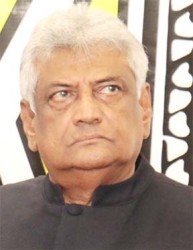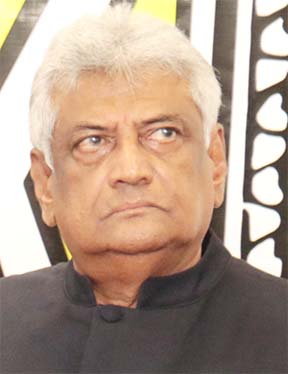Former Chairman of the Guyana Elections Commission (Gecom) Dr Steve Surujbally has advised his successor Justice James Patterson to push for the introduction of electronic voting and to resuscitate talks to commence an elections management course at the University of Guyana.
Surujbally told Stabroek News yesterday that he held a fruitful discussion with Patterson last Friday and urged him to give attention to the things that he was not successful in implementing as well as to build good relations with local and international partners.
Patterson, a former High Court judge was sworn in on October 19, two and a half hours after Granger met with Opposition Leader Bharrat Jagdeo to inform him of the rejection of a third list of candidates submitted by him and his unilateral selection of Patterson. Surujbally left office in February of this year.
According to Surujbally, during the meeting, which was held at Patterson’s request, he urged that attention should be given to electronic registration and electronic voting in conformity with a paper trail. “In other words, when you vote, it comes up electronically but you also have a chit showing you voted for yourself and the presiding officer will have that, not who you voted for but that you voted. You would get the response saying that you voted for the right things and it is registered as your vote, the way you wanted it,” he explained to Stabroek News.

He said that these are things that are the subject of debate worldwide because countries have tried electronic voting and in some cases it seemingly has not worked. “It is something that is getting better and better and improving… when we are going to go that way and should we go that way—and I daresay as the machines get more sophisticated and less liable for fraud that we might be in a position to do that,” he added.
Surujbally recalled that that he did not succeed with his plans to introduce electronic voting to Guyana but quickly pointed out that he came very close to doing so. He explained that commissioners on many occasions voted against its introduction although they were sent to other countries to have a firsthand look of the operation of such systems. He said that one of commissioners’ primary concerns was that Guyana did not have the necessary infrastructure to successfully introduce electronic voting.
Surujbally informed that the availability of human resources at elections time was also discussed. He said that usually for elections, Gecom has to seek out “very educated people” to run the polling stations and they number in the thousands. He said that these persons have to be continuously trained ahead of an election. “It would be good if at the University of Guyana we have a course on elections management,” he said, while recalling that Gecom has gone “very far with that” through collaboration with Alabama State University, in the US. “That came right up to the course, how much it would cost, who would be teaching the courses and then it did not go further,” he said, while adding that it may be something that Patterson would want to “resurrect.”
He also said he mentioned to Patterson that he should be in touch with organisations throughout the world that have a link to elections and elections management, including Caricom, the Union of South American Nations (UNASUR), the Organization of American States (OAS), the Carter Center and the Commonwealth Secretariat. “These are all agencies and bodies that he must make contact with and in some cases, like the OAS, they have a body right here in Guyana and so he can make contact with that person. The Carter Center has, in the meantime, has left. The important thing, however, is that he establish a contact because he will be needing these people in due course,” Surujbally added.
‘Necessary changes’
He also noted that he believes that Patterson may want to look at some “necessary changes,” in keeping with the Constitution. He mentioned that there is no Deputy Chairman. “So anytime the chairman wants to leave or has to leave the meeting, the meeting has to be adjourned; nobody can take it over and that has always been, for me, not tidy,” he said, while adding that Patterson may want to look at meeting local organisations, such as the Chambers of Commerce, the Private Sector Com-mission, the human rights bodies and the media. He said that from his observations, the latter is giving Patterson “a rough time.”
He said that Patterson did not identify any challenges and added that his requesting a meeting was the sensible thing to do. He recalled that when he was appointed, his predecessor spoke with him for three hours, giving him advice. He said he thought “it was only right that I do the same for my successor.” Surujbally expressed confidence that he has given some sound advice to Patterson.
“Mr. Patterson was greatly amenable to discussion and has a very pleasant personality, a great listener… He was quite lucid, I thought,” Surujbally noted, while adding that during the discourse he learnt that Patterson was doing a lot of research about what transpired during the last 16 years, which he called a good start. “He did not give me the impression that he wanted to change things for change sake…When you have a new government, it seems very often on very many occasions everything from the previous is sort of dispatched into the dustbin of history and we start anew but I did not get that impression from him,” he said.
The unilateral appointment of the 84-year-old retired judge, which both Granger and the Attorney General Bail Williams have sought to defend, has seen strong condemnation from civil society and calls for its revocation. The opposition has since filed a High Court motion challenging the appointment and has taken issue with Patterson stating on his Curriculum Vitae that he was the Chief Justice of Grenada. Patterson has since clarified that he accidently left out the word “acting.” Concerns have also been expressed about Patterson’s ability both to execute the duties of his office.
Surujbally declined to comment on these concerns. “I don’t know the man. I met him for the first time [on Friday],” he explained.
Last Thursday, when asked to respond to the criticism, Patterson said, “I have a classic response. No response.” He said that he would also not comment on arguments that the president acted unconstitutionally in appointing him. “I am not getting into that, other than saying that the president has been properly advised. That’s as far as I would go. He has his own intelligence. He has his own Attorney General and so he must listen to the Attorney General and listen to himself and a lot of interpretation of the law is common sense,” he said.






